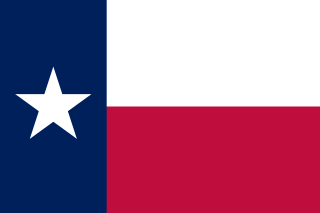
Screeching Weasel is an American punk rock band consisting of Ben Weasel (vocals), Trevor Jackson (guitar), Mike Hunchback (guitar), Zach "Poutine" Brandner (bass) and Pierre Marche (drums). Screeching Weasel is originally from the Chicago suburb of Prospect Heights, Illinois. The band was formed in 1986 by Ben Weasel and John Jughead. Since their formation, Screeching Weasel have reformed several times with line-up changes. Ben Weasel has been the only constant member, though Jughead was present in every incarnation of the band until 2009. Other prominent members include guitarist/bassist Dan Vapid and drummer Dan Panic, who have each appeared on six of the band's studio albums, and Green Day bassist Mike Dirnt who was briefly a member of the band.
The Riverdales were an American punk rock band from Chicago, Illinois made up of Screeching Weasel members. Bassist Dan Vapid and guitarist Ben Weasel are heavily influenced by the Ramones' sound and both serve as front-men, sharing lead vocals for the band. The Riverdales' original run lasted from 1994-1997. They reformed in 2003 to record their third studio album, and then parted ways until they once again reformed in 2008 and released a fourth studio album in July, 2009. The band's fifth studio album, Tarantula, was released digitally on June 8, 2010 and on CD and vinyl on June 22, 2010. The band broke up in March 2011 after a fight that broke out during a Screeching Weasel performance.
Fifteen was a punk rock band formed by Jeff Ott and Jack Curran. According to Ott, the band's only consistent member in its 11-year history, Fifteen had a total of fifteen members by the time the group disbanded in 2000: Jack Curran, Mikey Mischief, Mark Moreno, Jean Repetto, Lucky Dog, Chris Flanagan, John Ogle, Jesse Wickman, Joe Cable, John Quintos, Scott Pierce, Jim Prior, Lisa D., Vanessa Bain and Ott himself.
Aaron Elliott, better known as Aaron Cometbus, is an American musician, songwriter, and magazine editor, best known as the creator of the punk zine Cometbus.
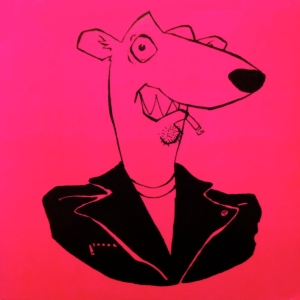
Boogadaboogadaboogada! is the second studio album by the Chicago-based punk rock band Screeching Weasel. The album was originally released on vinyl in December 1988 through Roadkill Records. It was the group's only album to feature Fish on bass and the last with Steve Cheese on drums, both leaving the band shortly after the album's release. Although still influenced by hardcore punk, the album also shows hints of the band's later Ramones-inspired sound.

My Brain Hurts is the third studio album by the Chicago-based punk rock band Screeching Weasel. The album was originally released on CD, vinyl and cassette in September 1991 through Lookout Records. It was the group's first album on Lookout as well as the only release with bassist Dave Naked and the first with drummer Dan Panic, the latter of which would go on to appear on several of the band's albums. The album marked a very distinct stylistic shift for the group, fully moving toward a Ramones-inspired sound and completely abandoning their previous hardcore punk influences as a condition made by vocalist Ben Weasel when reforming the band after a brief break-up.

Wiggle is the fifth studio album by the Chicago-based punk rock band Screeching Weasel. Initially planned for release in November 1992, the album was finally released on CD, vinyl and cassette on January 15, 1993 through Lookout Records. Due to a "cymbal hissing" in the original vinyl version, the album was remixed and re-released soon afterwards.
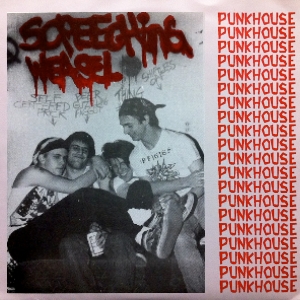
Punkhouse was the first EP by the Chicago-based punk rock band Screeching Weasel. The EP was originally released on 7-inch vinyl with a limited pressing of 500 copies on July 7, 1989 through Limited Potential Records. It was the band's only non-compilation release to feature drummer Brian Vermin and the first to feature Dan Vapid, who would be featured on many later Screeching Weasel albums. Musically, the songs on Punkhouse are in a similar vein to the band's previous album Boogadaboogadaboogada!, albeit with a rougher sound.

Anthem for a New Tomorrow is the sixth studio album by the American punk rock band Screeching Weasel. It was released in 1993 through Lookout! Records. It is often considered one of the band's best albums.
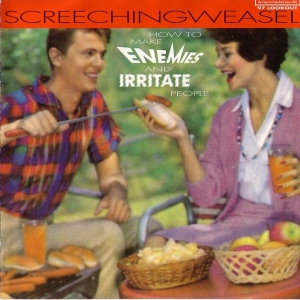
How to Make Enemies and Irritate People is the seventh studio album by the Chicago-based punk rock band Screeching Weasel. Planned as the group's final album, it was released in August 1994 on CD, vinyl and cassette through Lookout Records. Shortly before recording the album, bassist/backing vocalist Dan Vapid left the band and, as a result, Green Day bassist Mike Dirnt was recruited to play on the album.

Screeching Weasel is the self-titled debut studio album by the Chicago-based punk rock band Screeching Weasel. It was originally released on vinyl with a limited pressing of 1,000 copies in September 1987 through local independent label Underdog Records and was the band's only album with bassist Vinnie Bovine, who was fired the next year. Screeching Weasel documents the group's early years as a hardcore punk band, with the music being heavily influenced by bands such as Adrenalin O.D., Angry Samoans, Circle Jerks and Black Flag.

Lame Gig Contest is the only full-length studio album by the Berkeley, California-based punk rock band Crimpshrine. After previously being rejected by the band's label Lookout Records, it was finally released in January 1989 in Germany on Musical Tragedies. The first 1,000 copies of the album featured a yellow cover, while a later pressing of 500 was released with blue. Although the majority of the songs were recorded specifically for the album, Lame Gig Contest also contained tracks from previous sessions. The songs "Rearranged" and "Another Day" were originally featured on the Maximumrocknroll compilation Turn It Around! in 1987, while "Concrete Lawns", "MSFMB" and "2nd Generation Junkies" were unreleased recordings from the sessions of their Sleep, What's That? EP.

Love Songs for the Retarded is the second studio album by the American punk rock band the Queers, released in 1993 by Lookout! Records. It was the first of five studio albums the band would record for Lookout!, and their first by the lineup of singer and guitarist "Joe Queer" King, bassist Chris "B-Face" Barnard, and drummer Hugh O'Neill. It was also their first collaboration with Screeching Weasel frontman Ben Weasel, who produced the album and co-wrote two of its songs, and the first of three Queers albums recorded at Sonic Iguana Studio in Lafayette, Indiana with audio engineer Mass Giorgini, who would continue to work with the band on and off for the next 14 years as a producer and engineer. Love Songs for the Retarded became the Queers' highest-selling album, with sales surpassing 100,000 copies.

Beat Off is the fourth studio album by the American punk rock band the Queers, released in 1994 by Lookout! Records. Recorded during a time when the Queers' usual drummer, Hugh O'Neill, was on a forced leave of absence from the band to deal with heroin addiction, it featured Screeching Weasel drummer Dan Panic and guitarist Dan Vapid added to the lineup. It was the third and final Queers album produced by Screeching Weasel singer Ben Weasel, who insisted on a no-frills punk sound for the album and removed Vapid's tracks from the final mix without his knowledge.

Surf Goddess is an EP by the American punk rock band the Queers, released in February 1995 by Lookout! Records. It marked the return of longtime drummer Hugh O'Neill to the band, after a forced leave of absence to deal with heroin addiction. Former Screeching Weasel member Dan Vapid, who had been a member of the Queers in 1994, played on the EP as a guest guitarist. Surf Goddess was the result of band leader Joe King and Lookout! head Larry Livermore being dissatisfied with the production techniques on the band's prior album, 1994's Beat Off, which producer Ben Weasel had insisted on keeping basic. King and Livermore wanted to incorporate overdubbing and other effects which Livermore felt were essential to the Queers' sound. In addition to the title track, which was co-written by Weasel, and the Queers original "Quit Talkin'", the EP includes cover versions of Tommy James and the Shondells's "Mirage" and the Undertones' "Get Over You".
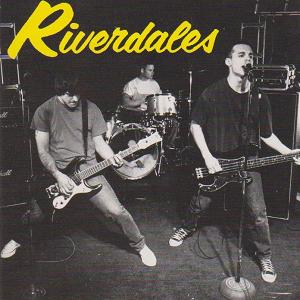
Riverdales is the eponymously-titled debut studio album by the Chicago-based punk rock band the Riverdales. Formed after the break-up of Screeching Weasel, the band sought to write more Ramones-inspired music and the album was released on June 7, 1995 through Lookout Records with the catalog number LK 120. The group supported the album by opening for Green Day on the initial US leg of the tour for their album Insomniac. Riverdales experienced substantial success on the tour, and the album became the group's best-selling release to date.
Between 1993 and 2000, a series of Ramones covers albums were released by Selfless Records, an independent record label based in Garland, Texas specializing in punk rock, on which bands influenced by seminal punk group the Ramones performed cover versions of entire Ramones albums. Under the Selfless label, Screeching Weasel, the Queers, and the Vindictives respectively covered the first three Ramones albums: Ramones (1976), Rocket to Russia (1977), and Leave Home (1977). Selfless then became Clearview Records and continued the series, with Boris the Sprinkler, the Parasites, the Mr. T Experience, the Beatnik Termites, and the McRackins respectively covering End of the Century (1980), It's Alive (1979), Road to Ruin (1978), Pleasant Dreams (1981), and Too Tough to Die (1984).




